DIY Insecticidal Soap for Trees and Shrubs
This insecticidal soap spray can be made at home for only a few dollars. It kills garden pests and it won’t harm people or pets. It can be used on fruit trees, shrubs, canes, and vines.
Herbal Insecticidal Soap
for Aphids, White Fly, Spider Mites, and Fungal Infections
(This post contains affiliate links.)
The June garden is actively growing. The fruit trees have set fruit. On close examination, though, it appears that something is eating the leaves of the apple trees. One tree has an aphid invasion. Another tree has 1 ½ inch long caterpillars munching on the leaves and covering the branch tips with a fine web. Forest tent caterpillars (Malacosoma disstria) were found on the leaves munching away. But that’s not all. There was also evidence of winter moth (Operophtera brumata) caterpillars with their webbing. Mr. Joybilee’s way of dealing with tent caterpillars is to get out a blow torch and torch the leaves wherever the webbing is on the branches. Unfortunately, that doesn’t 100% get rid of the caterpillars. It just deals with one nest. Any caterpillars that aren’t torched move on to another tree.
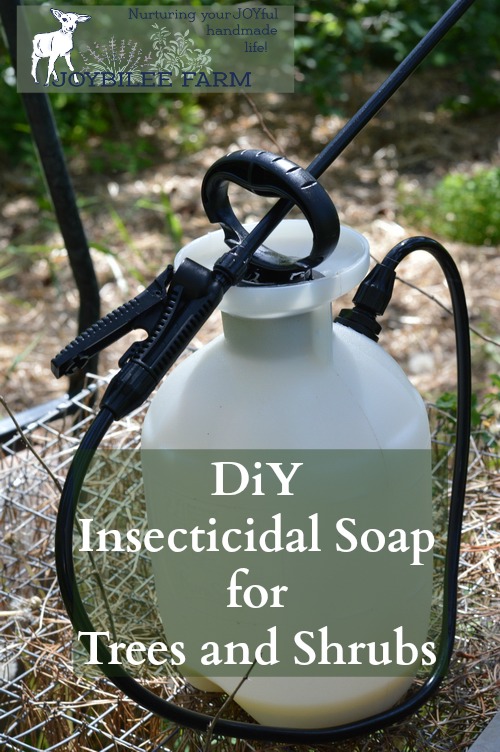
Organic pest control in the garden
I’ve tried some insecticidal sprays that call for pureed garlic, hot peppers, and ground-up bugs. The problem with those, besides the gross-factor, is they clog up the sprayer. Even just adding cayenne pepper to the liquid causes the filter of the sprayer to clog. Not cool if your sprayer is pressurized and you’ve only just managed to empty the wand before the spray dries up. Now you’ve got one gallon of hot pepper and bug-gut-laced liquid, under pressure inside the spray bottle and the only way to clear the filter is to release the pressure on the bottle. This means you are going to get hot pepper juice spraying up from the bottle as you lean your face very close to it, in order to undo the top. Well, this recipe won’t clog the sprayer. It’s just as effective as hot peppers and garlic juice at ridding your fruit trees and shrubs of aphids, caterpillars, and other insect pests that are eating your fruit trees.
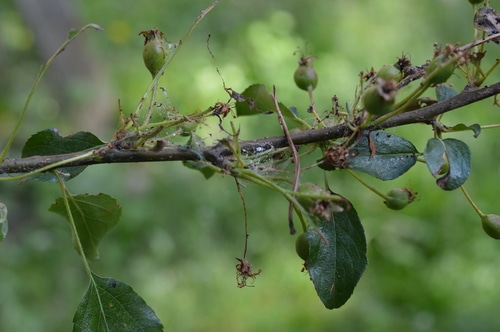
Winter moth damage on apples
This insecticidal soap spray can be made at home for only a few dollars. It kills garden pests by coating their bodies with oil. Since insects breathe through their skin, it smothers them. Then the oil stays on the leaves making them inhospitable to further predation. But it won’t harm pets or humans. Avoid spraying fruit shrubs with open flowers and pollinators at work.
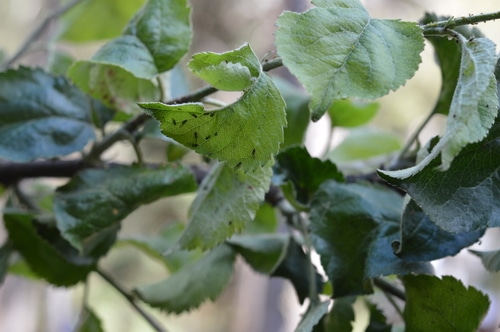
Aphids on the underside of leaves
This can be used on fruit trees, shrubs, canes, and vines. Avoid spraying on the vegetable garden, as the oil will cling to the leaves of your vegetables. It won’t harm the vegetables, but it may make them taste funny. For the vegetable garden hand picking and using diatomaceous earth is more effective than a foliar spray.
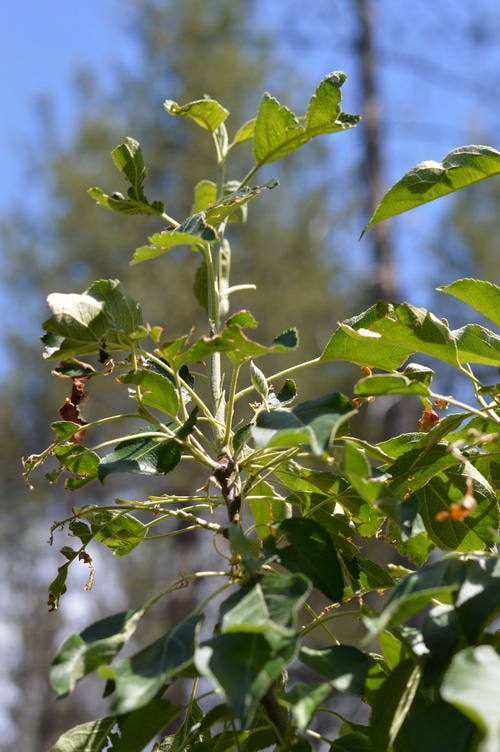
This recipe makes enough to fill a 1-gallon pressurized garden sprayer. This is the pressurized sprayer I have.
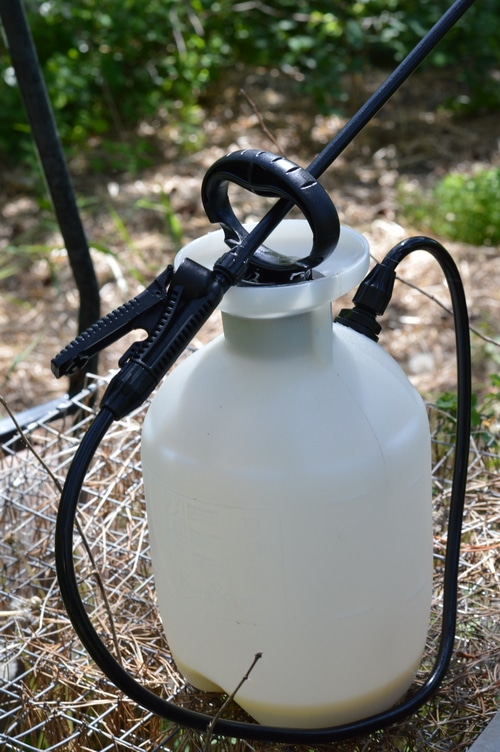
Herbal Insecticidal Soap Spray
Ingredients:
1 cup of canola or grapeseed oil
1 cup of kefir, yogurt, or whey
1 tbsp. Dr. Bonner’s™ Liquid Castile Soap
1 tsp. tea tree essential oil
1 tsp. D-limonene or orange essential oil
1 gallon of water, or enough to fill to the fill-line of your sprayer
Do not add any other ingredients. Do not substitute dish soap or laundry soap for the liquid castile soap. These are not the same chemically and could damage your plants. Powdered herbs or spices will plug the spray nozzle of your applicator.
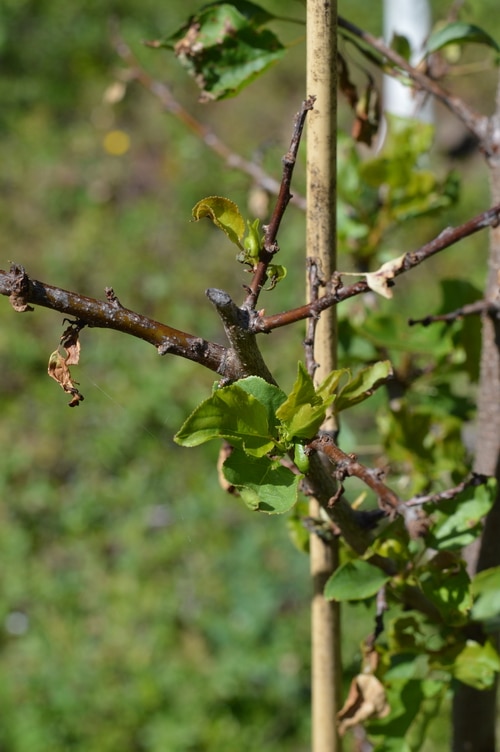
Apricot tree recovering after spraying webbing damage.
Method:
Add the ingredients directly to the plastic housing of your pressurized sprayer.
Secure the wand and the lid according to the manufacturer’s instructions. Shake the contents of the sprayer well to mix the oil and water.
Pressurize the sprayer using the built-in pump, by pumping the pressure handle until you feel resistance. Lock into position.
How to use the insecticidal soap
Apply liberally to all sides of leaves and branches wherever you see insect or caterpillar damage. The oil coats the bodies of aphids, mites, and whiteflies. The soap disrupts their cells. The D-limonene and tea tree essential oil also coats the leaves of the trees making them inhospitable to pests and helping to ward off a fungal disease that is spread by pests.
Pests must be sprayed directly with the spray for it to be lethal. Spray the underside as well as the top of the leaves. Avoid spraying if you see beneficial insects, like lacewings, bees, or ladybugs present. The oily spray could also harm them.
The kefir is an effective fungicide against powdery mildew and several mosaic viruses. If you don’t have kefir then substitute yogurt or whey in this recipe, for a similar benefit.
Plants should be resprayed 4 or 5 days after the first application to get any newly hatched larvae.
Cautions
Like commercial insecticidal soaps, avoid applying it in full sun, when the temperature is above 90F. Plants under water stress may be damaged by spraying. Water plants first before spraying. If a plant is wilted, avoid spraying and water instead. The best times to spray are after rain or in the early morning when the dew is still on the leaves. Since the spray is only effective when it is wet, avoid spraying when it’s hot because the spray will dry too quickly on the leaves, before it is effective.
Some plants are sensitive to soap sprays and in full sun, this can cause the leaves to wither and brown. Cherries, plums, Japanese maples, horse chestnut, mountain ash, jade, lantana, gardenia, bleeding heart and crown of thorns. If you notice that the leaves begin to turn brown after spraying, rinse off the spray with water.
Your Turn:
Try this insecticidal soap recipe for aphids, whitefly, and mites, and caterpillars as well as mildew and other fungus diseases on your fruit trees and shrubs. Let me know how it works for you.



Uh, if you remove the filter in that sprayer, your clog should be solved. Of course, every now and then you will have to remove the tip and clear it, but you won’t have to depressurize the sprayer.
Will this spray work for scale on a Meyer lemon? I have battled it for about 3 years now, never getting rid of it. I have been using neem oil. My intention is to get rid of the scale permanently. Thank you!
Can I spray my miniature rose bushes now before the aphids actually overtake them ? How long is the spray good for I only have two small bushes on my patio can I keep the bottle of spray the entire summer and reapply?
So hoping this works I lost both bushes to aphids last year